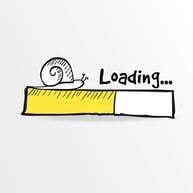One of the biggest lead-killers on the web is having a slow website. 
In 2009, a study by Forrester Research found that online shoppers expected pages to load in two seconds or fewer — and at three seconds, a large share abandon the site. Only three years earlier a similar Forrester study found the average expectations for page load times were four seconds or fewer.
How much of a difference can 1 extra second of load time mean? Ask Amazon.com. They ran a study in 2014 that found that one extra second of load time on their website would cost their company a total of $1.6 billion dollars, which even for a company as robust as Amazon isn’t just a simple rounding error.
If that’s what’s happening with a company like Amazon, imagine how much that extra second could be costing your business!
How speed kills.
One of the things that matters most for the overall user experience on a website is how quickly someone can find what they’re looking for. The longer someone has to wait online to get to the content they want, the less likely they are to hang around on your website and come back.
That means less traffic, poor search results and worst of all – fewer sales and conversions.
As far back as 2010, Google has been factoring page speed into their search results. That speed is measured by how quickly they can coax readers through their home page and onto their search results.
Melissa Meyer of Google fame performed a survey centered on user experience to find out whether Google Searchers preferred having 30 results per page or 10. While results suggest that users wanted 30 results per page, Meyer realized that that many results delivered 20% less traffic. Why? Because results were taking a half second slower to load and people were simply leaving.
Why speed kills your website.
As a result of the above findings, Google has made speed a critical component of their measurement. Why does it matter to you? Because if your site is slow – it’s not going to come up in results. And even if it does, people won’t be hanging around long and are even less likely to come back.
Especially if you’re operating a website that generates revenue based off of creating leads and conversions, you should take this data to heart. If you are the owner of an Ecommerce website or generate revenue off of page views, this advice should be taken as gospel. Simply put – the faster your site, the better.
So just how fast should your site be? Generally speaking, if you’re under 1.5 - 3 seconds of load time, you’re in good shape. If you’re below 1 second you’re absolutely crushing it. If it’s above that, you’re losing money and should call us to help!
What’s causing your website to run slowly?
There are dozens of reasons why websites are slow, but some issues arise more frequently than others. Here are some key indicators that could be at the root of why your website is so slow:
• Bulky Images & Graphics
• Overwhelmed DNS Server or Hosting
• Not using Browser Cashing
• Bulky Coding Structure
• Not using intelligent script loading
• Embedding external media
How these components hurt your website really depends on your website, it’s structure and it’s intricacies. The degree to which you – or someone else – need to get their hands dirty with the coding and back-end runaround varies greatly. For some it’ll be a significant coding overhaul, for others it could be a simple formatting issue. Regardless, it’s always important to make sure you’ve got someone who knows what they’re talking about to help speed up your site.




